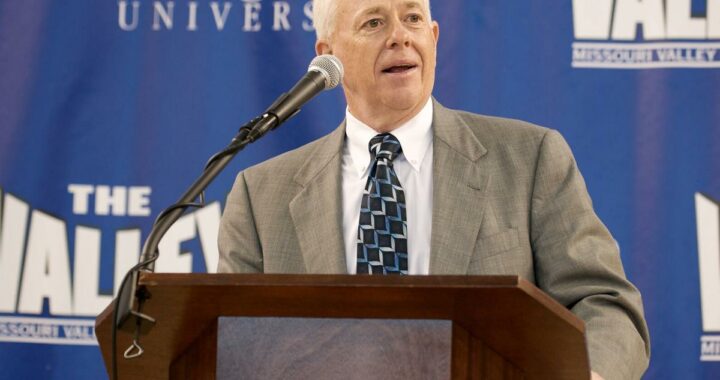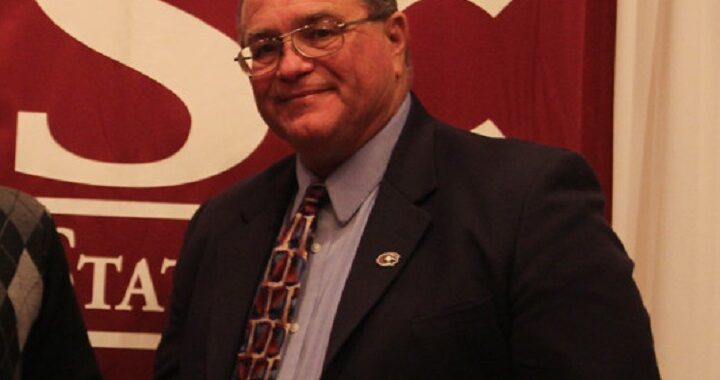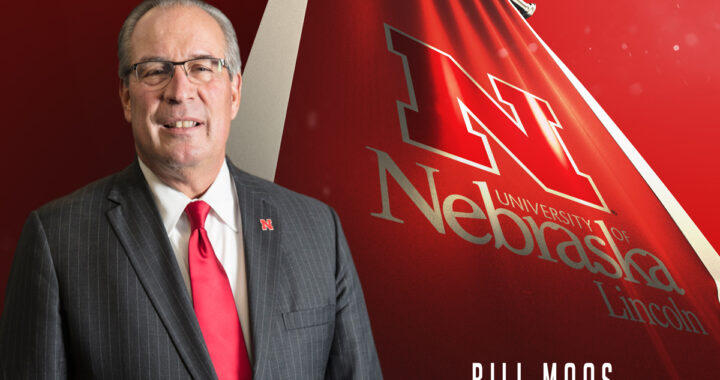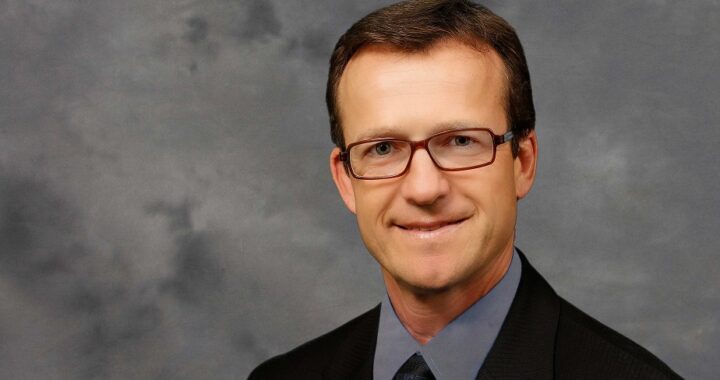Marc Bauer is one of the most accomplished coaches and respected Athletic Directors in all of NCAA Division II. He continues to be the face and force of UNK Athletics. After a stellar career at UNO, he built a powerhouse wrestling program at UNK. He and his wife Beth (former wrestling cheerleader at KHS) are the parents of four children and three grandchildren.
You made your mark as an athlete wrestling. What factors got you into wrestling?
I would be the first to admit that wrestling did not come naturally to me. I started in 4th grade. My dad was a high school official, and he had taken me to a match in Junction City, KS. I only lost one match in middle school, but I did not love the sport by any means. I was 5’0 tall and weighed 100 pounds entering high school. I might as well have been one of the tackling dummies or the water boy because I wasn’t much good on the football field.
As a small boy, I was trying to find my place in a masculine world of sports. I accomplished more than I would have ever imagined in high school, setting my sights on competing collegiately.
The adjustment from high school to college was like nothing I had ever endured. You had one of two choices, adapt or die! With the support and help of my teammates, the guidance by Coach Mike Denney, (UNO) and moral support from my wife, I started to find some success.
Good people got me into wrestling, and they helped keep me there.
Athletes constantly refer to times of failure as the fuel they used to reach their goals. Did you have one, and what was it?
Setbacks and failures are part of athletics, and I accepted the fact that I was going to have to work hard.
I jokingly tell people, “I like exceeding others’ expectations.” Although I was not always the most skilled or blessed with God-given talent, I pushed myself harder and smarter to overcome obstacles.
After college, you admitted you were reluctant to get into coaching. But, you ultimately did. What changed your mind?
As an elementary education major and someone that had started a family early, I knew that my senior season would be the last time I competed and that I would turn my focus to my career in education.
In my second year of teaching I found myself facing an opportunity to help coach a 5-week Junior High season. Although I was not fully committed to coaching, I had the opportunity to coach my youngest brother, Joshua. When I went to college, he was seven and I thought this was a good way to get to know him better and help him succeed in wrestling.
I committed to coaching Josh’s middle school team for two years, and I enjoyed working with the kids. During the second year, the UNK coach, Jeff Cardwell, called and asked if I would join the staff. All I had to do was show up to practice and work with the kids. I fell in love with coaching. I enjoyed the freedom of collegiate athletics and having the opportunity to impact the lives of student-athletes during a very challenging time of life.
Working with Jeff as an assistant, I had gone back to school fulltime and earned my master’s degree. Upon graduation, I committed to working part-time for Kearney Public Schools as a PE specialist at one of the elementary schools. One week after I accepted the job, Jeff resigned and moved back to Oregon with his family. It was late in the school year, so I took over on an interim basis. For the next 14-years, I taught elementary PE and was the head wrestling coach at UNK.
How did you build such a successful wrestling program at UNK (National Championships) during an era of budget cuts and Title IX?
I started by doing the little things first. I worked hard to win people over in our building, on our campus, and in our community. That meant regular visits to the equipment room with a 24 pack of Mountain Dew and Loper wrestling apparel. I sent personal letters inviting professors, administrators, and alumni to our home events, with hopes of building relationships across campus and the community.
It was not until my third year that I got an assistant coach. We started and grew two prominent kid’s wrestling tournaments and a camp system that became the lifeblood of our program. We did not just host tournaments and camps we hosted events that drew people back yearly.
It was not anyone thing or one person behind the rise of our program. It took an army of people who were willing to invest their time and resources to help ensure our student-athletes were getting the best possible experience at UNK and as members of our community.
What is the future of college wrestling?
As an Olympic sport, which continues to excel on the world-level and with the growth of women’s wrestling worldwide, I believe the sport has been positioned to continue to be a viable option to attract enrollment in higher education and provide opportunities for kids (boys and girls) to get involved in a sport that best suits them.
Like coaching, you’ve admitted that being an athletic director wasn’t always on your radar, yet you became one.
What triggered your passion for that path?
In 2011, I attended the NWCA Leadership Academy. Although the program was intended for young and aspiring coaches, I was asked to participate in helping identify the strengths and weaknesses of the program. The following year, the NWCA President, Mike Moyer, inquired if I would consider being a mentor in the program.
I agreed, and for several years, I mentored young coaches. I enjoyed the role. In 2016, I resigned from coaching, knowing the program was in great hands with Dalton Jensen, to pursue my doctorate in Interdisciplinary Leadership from Creighton University and moved in the Kinesiology Sports Science Program at UNK. As a professor, I was teaching future physical education teachers, and I enjoyed that immensely.
I was in the right place at the right time, and the opportunity to lead the athletic department at UNK became a reality. Chancellor Kristensen was looking for someone to restore the position of athletic director to one of loyalty and openness while giving consistent attention to balancing the needs of our student-athletes within the practical situation of our resources.
What is the biggest challenge facing college athletics today?
Most recently, the biggest challenge is helping our student-athletes through the uncertainty and challenges they face with the COVID pandemic, political unrest, and racial tensions.
We have seen an overwhelming increase in mental health issues. Although we are working to provide the best possible experience for student-athletes at UNK, many factors weigh heavily on them. Student-athletes today are high functioning young adults who want to make a difference in a world that seems turned upside down right now. The recent NCAA Student-Athlete COVID-19 Well-being Survey completed by 37,600 student-athletes in May 2020 shows that a high majority of them are not doing well.
Moreover, technology increasingly isolates our students and compounds the issues further, such as feeling overwhelmed or viewing themselves as failures. We want our student-athletes to know that we care deeply for them and that we are here to support and help them get through these tough times.
How can the Nebraska Greats Foundation assist UNK in identifying former Lopers who may need assistance with medical issues?
The NGF has already had a tremendous impact on our campus. In July 2018, NGF helped Preston Hall’s family after Preston was in a life-threatening head-on car collision. NGF came alongside Preston’s family to help at a time when they were least expecting it, yet had a tremendous impact helping them through the financial challenges that they faced.
We are blessed to have an organization like the Nebraska Greats Foundation to assist current or former Nebraska college athletes. The best way to identify former Lopers who may need assistance with medical issues is to continue to spread the word about the amazing deeds of NGF. Such deeds are often the work of ordinary people coming alongside those in need. For some, it may be the miracle they need to help them shine once again.



